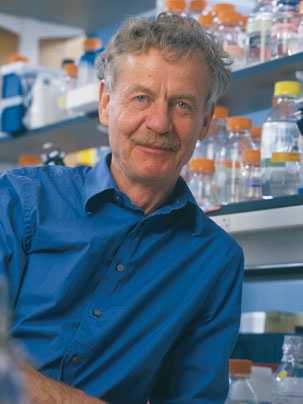Rudolf Jaenisch, professor of biology and a founding member of the Whitehead Institute, is MIT's James R. Killian Jr. Faculty Achievement Award winner for 2009-2010.
The award was announced at the Wednesday, May 20, faculty meeting.
A pioneer in the field of mammalian developmental genetics, Jaenisch helped found the area of transgenic science, the science of gene transfer for making mouse models, which is now widely used for studying human genetic diseases.
"This work became the foundation for his subsequent research and discoveries in stem cell biology, mammalian cloning, and the epigenetic regulation of gene expression -- work which has opened up new horizons in stem cell therapy and regenerative medicine," said Terry Knight, professor of design and computation and chair of the Killian Award selection committee, reading from the award citation.
Established in 1971 as a tribute to MIT's 10th president, the Killian Award recognizes extraordinary professional accomplishment by an MIT faculty member. The winner is asked to deliver a lecture in the spring term.
The award was "totally unexpected," Jaenisch said. "I think recognition from your colleagues, from your institution, is in a totally different category than an award from outside. It's much more of a honor."
Jaenisch received his doctorate in medicine from the University of Munich in 1967. Before coming to the Whitehead in 1984, he was head of the Department of Tumor Virology at the Heinrich Pette Institute at the University of Hamburg. He has co-authored more than 375 research papers and has received numerous awards, including the Boehringer Mannheim Molecular Bioanalytics Prize in 1997, the first Gruber Prize in 2001, the Koch Prize in 2002, the Brupbacher Foundation Cancer Research Prize in 2003, the Max Delbrück Medal in 2006, the Vilcek Prize in 2007, and the Massry Prize in 2008.
Jaenisch "has made landmark contributions to his field year after year, decade after decade, throughout his 40-year career," Knight said.
His most recent breakthrough is in cellular reprogramming. He has developed strategies for reprogramming fully differentiated adult cells into induced pluripotent stem cells, or IPS cells, which have the capability to grow into any cell type in the body. This work has enormous potential for the study and possible treatment of human diseases, through the possibility of growing healthy cells from a patient's own cells, according to the award citation.
Jaenisch has taken part in the debates surrounding cloning, and has helped to educate the public on the distinctions between therapeutic cloning, which involves the use of stem cells for curing disease, and reproductive cloning.
In addition to Knight, the Killian Award selection committee for 2009-2010 included faculty members Thomas J. Greytak, the Lester Wolfe Professor of Physics; Rebecca M. Henderson, the George Eastman Kodak LFM Professor of Management in the MIT Sloan School of Management; John J. Hildebidle, professor of literature; and Alan V. Oppenheim, the Ford Professor of Engineering.
A version of this article appeared in MIT Tech Talk on June 3, 2009 (download PDF).






